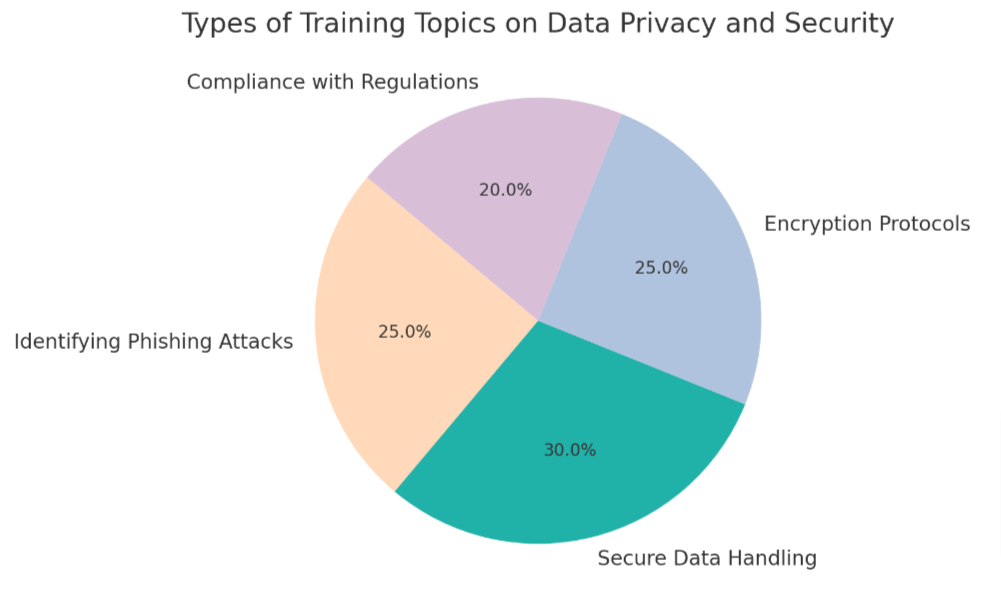Elevating Security Standards: Data Privacy Training for Live Chat Agents
As more people chat online, keeping conversations private gets tricky. Did you know that data leaks in live chats can cost companies millions? Our post lays out easy steps to train for better live chat security and privacy.
Keep your chats safe!
Key Takeaways
- Select a secure live chat provider with end-to-end encryption to protect sensitive info and comply with privacy laws.
- Regularly update your team on spotting phishing scams, email fraud, and other cyber threats in live chats.
- Use advanced security like multi – factor authentication and encryption to stop unauthorized access to private conversations.
- Conduct ongoing privacy training for all employees involved in live chat to maintain customer trust and data integrity.
- Stay current with industry regulations by updating policies related to data security and ensuring regular compliance audits.
Importance of Data Privacy and Security in Live Chat Settings
Keeping your live chat conversations secure protects not just company secrets but also prevents personal customer data from falling into the wrong hands. Live chat settings are prime targets for cybercriminals because they often contain valuable information such as credit card numbers, addresses, and personal details that can lead to fraud or identity theft.
Rigorous data protection protocols must be put in place to ensure digital citizenship norms are upheld and sensitive information is handled responsibly.
Companies must stay vigilant against potential breaches by adopting robust privacy regulations and cybersecurity measures. Adopting these practices helps maintain consumer confidence since users need to trust that their interactions are private and protected.
Secure communication via live chat isn’t just about technology; it’s crucial for safeguarding against financial loss and preserving your business’s reputation. This focus on security leads directly into the exploration of common threats encountered in live chat environments, which we’ll discuss next.
Common Threats in Live Chat Security
Email fraud, phishing attacks, internal data breaches, identity fraud, and cyber extortion are some of the common threats that can compromise data privacy and security in live chat settings.
It’s important to be aware of these potential risks and take necessary precautions to safeguard sensitive information.
Email fraud
In live chat settings, email fraud acts as a gateway for criminals to access confidential information. Scammers often pose as legitimate company representatives and send deceptive emails that look incredibly real.
They might include urgent-sounding messages that trick employees into sharing sensitive customer data or clicking on malicious links. These fraudulent emails can install malware or lead users to fake websites designed to steal login credentials.
Protecting against email fraud requires vigilant training on data handling practices and recognizing suspicious activity. Employees should learn how to spot red flags in email communication, such as unexpected requests for personal information or unknown sender addresses.
Companies need secure messaging protocols and regular security training updates to stay ahead of scammers’ tactics. By reinforcing these measures within your team, you create a first line of defense that preserves the integrity of your live chat services and protects valuable personal data from falling into the wrong hands.
Phishing attacks
Phishing attacks in live chat settings are a sneaky way for cybercriminals to trick employees and customers into giving away sensitive information. These attackers often pose as trustworthy sources, sending messages that seem legitimate at first glance.
They aim to obtain personal data such as passwords, credit card numbers, or other private details. Training on how to spot these deceptive tactics can greatly reduce the risk of falling victim to phishing.
Live chat agents must stay vigilant against suspicious links or requests for confidential information. It’s crucial they learn how various phishing attempts look and operate so they can act quickly when something doesn’t appear right.
Secure messaging protocols help, but ultimately it’s the alertness and preparedness of each individual that forms the frontline defense against these harmful security breaches. Educating all team members about potential threats empowers them to protect both themselves and the company’s valued clients from phishing schemes designed to undermine data privacy and online security.
Internal data breaches
After addressing the threat of phishing attacks, it’s crucial to consider the risk of internal data breaches in live chat settings. Employees with access to sensitive information can sometimes be the source of unintentional or deliberate data breaches.
Without proper training and security measures, these breaches could lead to compromised customer data or intellectual property theft, posing significant risks for businesses.
Implementing robust security protocols and ongoing privacy training can help minimize the risk of internal data breaches. Regular monitoring and access control mechanisms are also essential in preventing unauthorized access and ensuring that confidential information stays protected within live chat platforms.
Identity fraud
Identity fraud occurs when someone uses another person’s personal information to impersonate them for deceptive or illegal purposes. This can include stealing identities to access financial accounts, obtain credit, or make fraudulent purchases.
As live chat often involves sharing personal information and conducting transactions, it’s crucial to be aware of the potential risks of identity fraud and take proactive measures to prevent it.
Implementing stringent identity verification processes and encryption protocols within live chat platforms is essential in safeguarding users against this type of cybercrime.

Cyber extortion
Cyber extortion occurs when hackers threaten to expose sensitive information or disrupt online services unless a ransom is paid. This malicious tactic can lead to significant financial and reputational damage for businesses, making it crucial to implement robust security measures and privacy protocols in live chat settings.
By prioritizing employee training on recognizing and responding to cyber extortion attempts, organizations can bolster their defenses against these threats.
Additionally, establishing clear communication channels and response procedures during potential cyber extortion incidents is essential for mitigating the impact of such attacks. With a proactive approach to cybersecurity and data protection, businesses can minimize the risk of falling victim to cyber extortion schemes while safeguarding sensitive information from unauthorized access or exploitation.
Measures to Ensure Secure Live Chat Experience
Choosing a secure live chat provider and implementing advanced security features are essential for maintaining data privacy and security. Prioritizing security and privacy training for all employees is also crucial to ensure a secure live chat experience.
Choosing a secure live chat provider
To ensure data privacy and security in live chat settings, selecting a secure live chat provider is crucial. Look for providers that offer end-to-end encryption to safeguard sensitive information from unauthorized access.
Additionally, opt for providers that comply with industry regulations and have robust security measures in place to protect against cyber threats such as phishing attacks and data breaches.
Utilizing a secure live chat provider allows businesses to prioritize the protection of personal data while maintaining trust with customers and staying compliant with privacy guidelines.
Prioritizing security and privacy training
Implement regular security and privacy training sessions for all staff members handling live chat interactions. Emphasize the identification of potential security threats such as phishing attacks and internal data breaches.
Focus on best practices in securely managing personal data to ensure compliance with privacy regulations and uphold strong cybersecurity measures.
Educate your team about secure communication protocols, including chat encryption, and reinforce the importance of adhering to privacy guidelines when engaging in live chats. Encourage proactive adoption of stringent security measures to safeguard sensitive information while interacting with customers online.
Using data privacy features
After prioritizing security and privacy training, it is crucial to implement data privacy features to enhance the security of live chat interactions. Secure messaging platforms offer encryption protocols that safeguard personal data from unauthorized access.
By incorporating chat privacy controls and adhering to privacy guidelines, organizations can ensure that sensitive information is protected during live chat communications.
Furthermore, by enforcing security protocols and complying with privacy regulations, businesses can establish a trust-based relationship with customers while upholding data protection standards.
Implementing advanced security features and certificates
To enhance security, integrate advanced authentication protocols and digital certificates to authenticate the identity of chat participants. Employing end-to-end encryption and Transport Layer Security (TLS) ensures that communication remains confidential and tamper-proof against potential eavesdropping or data interception attempts.
By enforcing multi-factor authentication (MFA), users are required to provide additional verification beyond just a password, significantly bolstering the security of live chat interactions.
Regular updating of security certificates further safeguards against vulnerabilities and helps maintain a secure environment for sensitive data exchange.
Ensuring compliance with data privacy regulations
To ensure compliance with data privacy regulations, businesses must regularly review and update their policies and procedures. This involves staying informed about the latest changes in data protection laws and making necessary adjustments to internal practices.
It also requires conducting regular audits to identify any potential gaps in compliance with relevant regulations.
Furthermore, organizations need to prioritize ongoing training for employees on new developments in data privacy laws and best practices for handling sensitive information. This ensures that everyone within the company is aware of their responsibilities when it comes to protecting customer data and maintaining regulatory compliance.

Why Utilizing a Secure Live Chat is Essential
Utilizing a secure live chat is essential to prevent costly data leaks, maintain customer trust and reliability, stay compliant with industry regulations, and protect intellectual property.
It also ensures that personal data is safeguarded and communication remains secure.
Preventing costly data leaks
Preventing costly data leaks is crucial for safeguarding sensitive information and avoiding financial repercussions. Implementing robust security measures, including chat encryption and secure messaging protocols, can thwart potential breaches that may lead to significant financial loss.
By prioritizing privacy training and compliance with data security regulations, businesses can mitigate the risk of costly data leaks, ensuring the protection of valuable intellectual property and customer trust.
To prevent costly data leaks, organizations must continually update their security protocols and regularly educate employees on the importance of secure communication practices. Adhering to stringent privacy guidelines and employing advanced data handling measures are essential in fortifying defenses against cyber threats that could result in detrimental financial implications.
Maintaining customer trust and reliability
To maintain customer trust and reliability, it is vital to prioritize data privacy and security in live chat interactions. By implementing robust security measures and complying with privacy regulations, businesses can assure their customers that their sensitive information is well-protected.
This proactive approach not only safeguards customer data but also demonstrates a commitment to maintaining a secure and trustworthy online environment, fostering long-term relationships built on mutual respect and confidence.
Delivering reliable service ensures that customers feel confident when engaging in live chat interactions while protecting their personal information. It establishes a sense of dependability that reinforces the integrity of the brand, contributing to positive customer experiences and sustained loyalty over time.
Staying compliant with industry regulations
To comply with industry regulations, it is essential to regularly update security measures and privacy features in live chat settings. Implementing robust data protection protocols and maintaining adherence to privacy guidelines can safeguard personal data and intellectual property.
By prioritizing compliance with data security and privacy regulations, businesses uphold their responsibility to protect sensitive information and ensure secure communication channels for their customers.
Ensuring compliance with industry standards involves incorporating stringent security protocol within live chat platforms. By adhering to privacy training practices, companies can create a cyber-secure environment while promoting workplace AI protections that align with data handling practices mandated by relevant laws and regulations.
Protecting intellectual property
To protect intellectual property in live chat settings, it’s essential to implement measures such as encryption and secure data handling practices. Utilizing a secure live chat provider with robust privacy features can help prevent unauthorized access and data breaches that could compromise sensitive information.
Additionally, keeping employees well-trained on the importance of safeguarding intellectual property and adhering to data protection regulations is crucial for maintaining the integrity of proprietary assets.
Implementing stringent security protocols and educating team members about the significance of preserving intellectual property within live chats can ultimately mitigate the risk of unauthorized access or leakage.
Conclusion
In conclusion, prioritizing security and privacy training is crucial for maintaining a secure live chat environment. Implementing advanced security features and certificates enhances protection against common threats like phishing attacks and identity fraud.
Choosing a secure live chat provider ensures compliance with data privacy regulations while safeguarding personal data in online interactions. Utilizing a secure live chat not only prevents costly data leaks but also strengthens customer trust and reliability in digital communications.
Protecting intellectual property and staying compliant with industry regulations are essential reasons to implement measures for ensuring a secure live chat experience.

